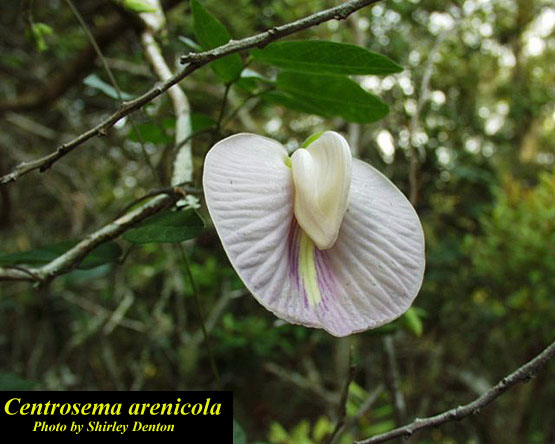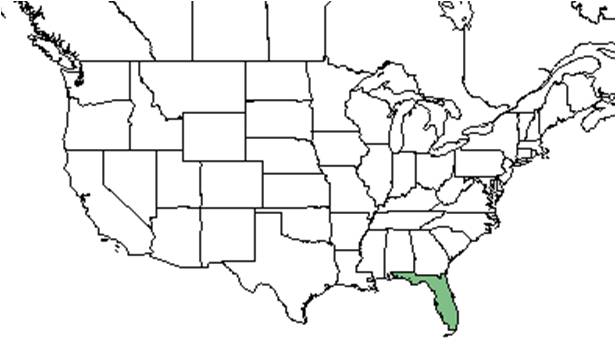Difference between revisions of "Centrosema arenicola"
(→Taxonomic notes) |
Juliec4335 (talk | contribs) |
||
| Line 30: | Line 30: | ||
===Habitat=== <!--Natural communities, human disturbed habitats, topography, hydrology, soils, light, fire regime requirements for removal of competition, etc.--> | ===Habitat=== <!--Natural communities, human disturbed habitats, topography, hydrology, soils, light, fire regime requirements for removal of competition, etc.--> | ||
In the Coastal Plain in Florida, ''C. arenicola'' has been found to occur in upland hardwood associations of ''Quercus'' and ''Sabal palmetto.''<ref name="FSU">Florida State University Robert K. Godfrey Herbarium database. URL: [http://herbarium.bio.fsu.edu http://herbarium.bio.fsu.edu]. Last accessed: October 2015. Collectors: Olga Lakela. States and Counties: Florida: Citrus, Hernando, Hillsborough. Compiled by Tall Timbers Research Station and Land Conservancy.</ref> Associated species include ''Quercus, Myrica, Sabal palmetto, Eupatorium, Galactia'', and ''Clematis.''<ref name="FSU"></ref> | In the Coastal Plain in Florida, ''C. arenicola'' has been found to occur in upland hardwood associations of ''Quercus'' and ''Sabal palmetto.''<ref name="FSU">Florida State University Robert K. Godfrey Herbarium database. URL: [http://herbarium.bio.fsu.edu http://herbarium.bio.fsu.edu]. Last accessed: October 2015. Collectors: Olga Lakela. States and Counties: Florida: Citrus, Hernando, Hillsborough. Compiled by Tall Timbers Research Station and Land Conservancy.</ref> Associated species include ''Quercus, Myrica, Sabal palmetto, Eupatorium, Galactia'', and ''Clematis.''<ref name="FSU"></ref> | ||
| + | |||
| + | ''Centrosema arenicola'' is an indicator species for the North Florida Longleaf Woodlands community type as described in Carr et al. (2010).<ref>Carr, S.C., K.M. Robertson, and R.K. Peet. 2010. A vegetation classification of fire-dependent pinelands of Florida. Castanea 75:153-189.</ref> | ||
===Phenology===<!--Timing off flowering, fruiting, seed dispersal, and environmental triggers. Cite PanFlora website if appropriate: http://www.gilnelson.com/PanFlora/ --> | ===Phenology===<!--Timing off flowering, fruiting, seed dispersal, and environmental triggers. Cite PanFlora website if appropriate: http://www.gilnelson.com/PanFlora/ --> | ||
Revision as of 15:54, 17 July 2020
| Centrosema arenicola | |
|---|---|

| |
| Photo by Shirley Denton (Copyrighted, use by photographer’s permission only), Atlas of Florida Vascular Plants | |
| Scientific classification | |
| Kingdom: | Plantae |
| Division: | Magnoliophyta - Flowering plants |
| Class: | Magnoliopsida - Dicotyledons |
| Order: | Fabales |
| Family: | Fabaceae ⁄ Leguminosae |
| Genus: | Centrosema |
| Species: | C. arenicola |
| Binomial name | |
| Centrosema arenicola (Small) F.J. Herm. | |

| |
| Natural range of Centrosema arenicola from USDA NRCS Plants Database. | |
Common names: Pineland butterfly pea; sand butterfly pea
Contents
Taxonomic notes
Synonyms: Centrosema arenicolum (Small) F.J.Herm.; Bradburya arenicola Small; Bradburya floridana Britton
Varieties: none
Description
Distribution
Ecology
Habitat
In the Coastal Plain in Florida, C. arenicola has been found to occur in upland hardwood associations of Quercus and Sabal palmetto.[1] Associated species include Quercus, Myrica, Sabal palmetto, Eupatorium, Galactia, and Clematis.[1]
Centrosema arenicola is an indicator species for the North Florida Longleaf Woodlands community type as described in Carr et al. (2010).[2]
Phenology
Flowers in August and September.[1]
Pollination
The following Hymenoptera families and species were observed visiting flowers of Centrosema arenicola at Archbold Biological Station:[3]
Apidae: Bombus pennsylvanicus
Megachilidae: Megachile integra, M. mendica
Conservation and management
Cultivation and restoration
Photo Gallery
References and notes
- ↑ 1.0 1.1 1.2 Florida State University Robert K. Godfrey Herbarium database. URL: http://herbarium.bio.fsu.edu. Last accessed: October 2015. Collectors: Olga Lakela. States and Counties: Florida: Citrus, Hernando, Hillsborough. Compiled by Tall Timbers Research Station and Land Conservancy.
- ↑ Carr, S.C., K.M. Robertson, and R.K. Peet. 2010. A vegetation classification of fire-dependent pinelands of Florida. Castanea 75:153-189.
- ↑ Deyrup, M.A. 2015. Database of observations of Hymenoptera visitations to flowers of plants on Archbold Biological Station, Florida, USA.